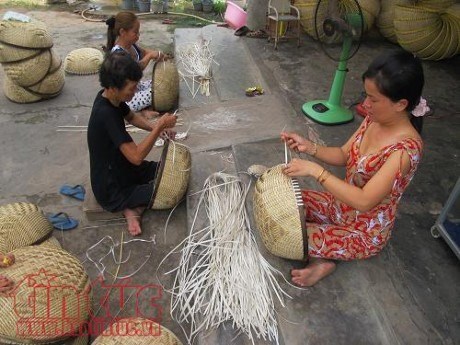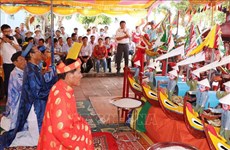Vocational training aids HCM City’s rural folk
Many people in Ho Chi Minh City’s rural areas have steady jobs thanks to a city programme to provide free vocational training.
 Many people in rural areas in HCM City have steady jobs thanks to a programme to provide free vocational training (Source: VNA)
Many people in rural areas in HCM City have steady jobs thanks to a programme to provide free vocational training (Source: VNA)HCM City (VNA) -
Many people in Ho Chi Minh City’s rural areas have stable jobs thanks to a city
programme to provide free vocational training.
Nguyen Thi Bay of Nha Be district’s Phuoc Kien commune is one of the beneficiaries.
She said in the past her family had been dependent on agriculture for a livelihood, but its farmlands were acquired for the construction of an industrial park.
Local authorities and the Farmers Association in Nha Be district put Bay in the free vocational training programme for rural residents.
She learnt sewing for three months at the district vocational training centre.
Bay also received a loan at a low interest rate to buy a sewing machine and was introduced to many customers.
Things have looked up since: She has five sewing machines and employs several people, and her income is more than a dozen million VND a month.
Nha Be has hundreds of such people with steady incomes thanks to the vocational training, the district Economic Division reported.
According to relevant agencies, more than 89 percent of people who got training in agriculture have jobs.
The city’s Department of Agriculture and Rural Development reported that 20,652 rural people were trained in agriculture between 2011 and 2016, accounting for 35 percent of the total number of rural residents who got vocational training.
The municipal People’s Committee this year aims to provide training for 12,000 rural residents in the outlying districts of Can Gio, Nha Be, Cu Chi, Binh Chanh, and Hoc Mon, 3,470 in agriculture and the rest in other vocational skills.
Of them, more than 80 percent are expected to get jobs.
People covered by State policies, poor and near poor people, ethnic minorities, and disabled people get priority under the training programme.
Those affected by public projects too get priority.
Trainees get travelling and accommodation allowances if the vocational training centre is far from their home.
Tran Ngoc Ho, deputy head of the department, said the rural vocational training programme helps restructure agricultural and the labour force and improve the incomes and lives of farmers, contributing to poverty reduction.
It is very important that people who get the training should also get jobs, he added.
Tran Anh Tuan, deputy head of the Centre for Forecasting Manpower Needs and Labour Market Information, said more than one million people of working age live in the city’s rural areas.
Many have low academic knowledge and skills and need to be trained, he said.
Trainees are offered 65 occupations to choose from, including processing and preservation of agricultural and forest products and seafood and production of construction materials, he said.
The city’s programme dovetails with a national programme to build new rural areas and restructure agriculture.
Nguyen Trong Liem, head of the city Agriculture Development Agency, said the city can fully meet the demand for training in agriculture.
It offers many long-term and professional training programmes at the agricultural promotion centre, bio-technology centre, Management Board of the city’s High-Tech Agricultural Park and elsewhere, he said.
However, they need to constantly update their training programmes, he added.-VNA
Nguyen Thi Bay of Nha Be district’s Phuoc Kien commune is one of the beneficiaries.
She said in the past her family had been dependent on agriculture for a livelihood, but its farmlands were acquired for the construction of an industrial park.
Local authorities and the Farmers Association in Nha Be district put Bay in the free vocational training programme for rural residents.
She learnt sewing for three months at the district vocational training centre.
Bay also received a loan at a low interest rate to buy a sewing machine and was introduced to many customers.
Things have looked up since: She has five sewing machines and employs several people, and her income is more than a dozen million VND a month.
Nha Be has hundreds of such people with steady incomes thanks to the vocational training, the district Economic Division reported.
According to relevant agencies, more than 89 percent of people who got training in agriculture have jobs.
The city’s Department of Agriculture and Rural Development reported that 20,652 rural people were trained in agriculture between 2011 and 2016, accounting for 35 percent of the total number of rural residents who got vocational training.
The municipal People’s Committee this year aims to provide training for 12,000 rural residents in the outlying districts of Can Gio, Nha Be, Cu Chi, Binh Chanh, and Hoc Mon, 3,470 in agriculture and the rest in other vocational skills.
Of them, more than 80 percent are expected to get jobs.
People covered by State policies, poor and near poor people, ethnic minorities, and disabled people get priority under the training programme.
Those affected by public projects too get priority.
Trainees get travelling and accommodation allowances if the vocational training centre is far from their home.
Tran Ngoc Ho, deputy head of the department, said the rural vocational training programme helps restructure agricultural and the labour force and improve the incomes and lives of farmers, contributing to poverty reduction.
It is very important that people who get the training should also get jobs, he added.
Tran Anh Tuan, deputy head of the Centre for Forecasting Manpower Needs and Labour Market Information, said more than one million people of working age live in the city’s rural areas.
Many have low academic knowledge and skills and need to be trained, he said.
Trainees are offered 65 occupations to choose from, including processing and preservation of agricultural and forest products and seafood and production of construction materials, he said.
The city’s programme dovetails with a national programme to build new rural areas and restructure agriculture.
Nguyen Trong Liem, head of the city Agriculture Development Agency, said the city can fully meet the demand for training in agriculture.
It offers many long-term and professional training programmes at the agricultural promotion centre, bio-technology centre, Management Board of the city’s High-Tech Agricultural Park and elsewhere, he said.
However, they need to constantly update their training programmes, he added.-VNA













